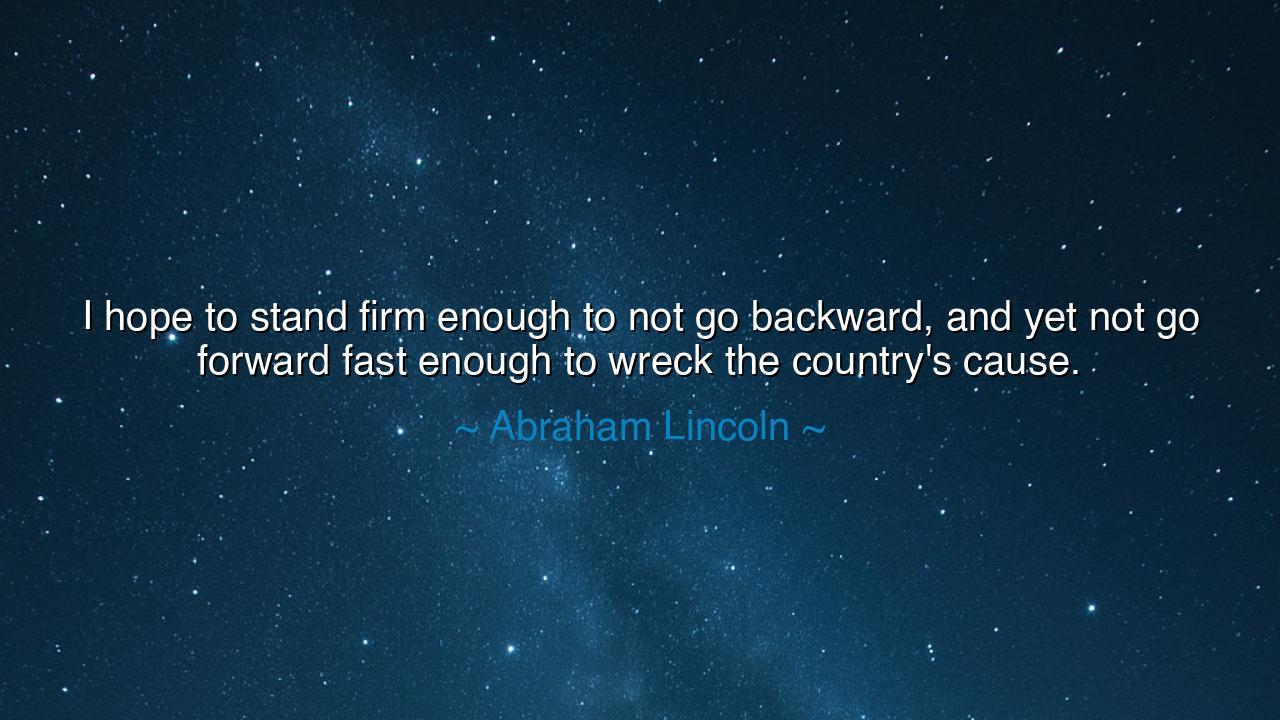
I hope to stand firm enough to not go backward, and yet not go
I hope to stand firm enough to not go backward, and yet not go forward fast enough to wreck the country's cause.






The words of Abraham Lincoln—“I hope to stand firm enough to not go backward, and yet not go forward fast enough to wreck the country's cause”—resound through the ages like the toll of a great and solemn bell. They were spoken by a man who carried the fate of a nation upon his shoulders, whose every step had to balance mercy and resolve, patience and power. In these words lies not merely the wisdom of leadership, but the eternal tension of human duty—the struggle to move with righteousness when the path ahead is shrouded in uncertainty.
Lincoln’s hope to stand firm speaks of steadfastness, of the courage to remain unmoved when the world trembles around you. He lived in an age of division and blood, when the very soil of America was split by the cries of freedom and the chains of slavery. To stand firm in such a time was not to cling stubbornly to stillness, but to root oneself in principle. The oak does not resist the storm by chasing the wind—it holds its ground by trusting its roots. So too did Lincoln anchor himself in conscience and justice, even when the tempest of public opinion threatened to tear him apart.
Yet the second part of his wisdom carries an equally deep truth: “not go forward fast enough to wreck the country's cause.” For progress without prudence can destroy the very thing it seeks to save. Lincoln knew that the passions of men, even when born of righteousness, could become wildfire if not tempered by patience. He understood that to heal a wounded nation, one must move not with fury but with foresight. The great art of leadership is not only to see the destination, but to guide one’s people toward it at the pace their hearts can bear.
In the chronicles of old, we find a mirror to this wisdom in the tale of Solon of Athens, the lawgiver who reformed his city’s broken order. When urged by zealots to abolish the old ways in a single stroke, Solon refused. He said, “I have given the people not the best laws, but the best they would receive.” Like Lincoln, he knew that change, to endure, must take root in understanding, not be forced by impatience. Both men grasped the sacred rhythm of history—that wisdom walks neither too swiftly nor too slow, but moves in harmony with the readiness of the people.
There is humility in Lincoln’s words, as well as power. He does not claim certainty; he hopes to stand firm, he hopes not to move too fast. The greatest leaders, and indeed the greatest souls, are those who act not with arrogance but with trembling reverence for the burden they bear. To lead—or to live—with such balance is to walk a narrow bridge between the abysses of fear and recklessness. And in that balance lies true greatness.
In our own time, we too are tempted toward extremes—some clinging to the past, others rushing heedlessly toward the future. Lincoln’s wisdom teaches that the true path of progress is one of measured courage. To “stand firm” is to hold fast to truth and virtue; to “not go forward too fast” is to honor the delicate fabric of what we seek to protect. Whether in nations, families, or the chambers of one’s heart, this equilibrium is the foundation of endurance.
Let this then be the teaching, passed from age to age: wisdom is balance. The impetuous destroy what the patient preserve; the fearful lose what the steadfast guard. Learn to discern the hour to move and the hour to wait. In your own trials, whether of conscience or of purpose, remember Lincoln’s example. Stand firm enough to defend what is right, yet humble enough to pace your steps with care.
And when you face your own crossroads—when passion and prudence pull at you from opposite sides—speak these words to yourself: “I will stand firm enough not to go backward, and not go forward so fast as to wreck the cause.” For in that quiet strength lies the essence of wisdom, the art of building what lasts, and the enduring courage of one who walks the narrow path between chaos and eternity.






AAdministratorAdministrator
Welcome, honored guests. Please leave a comment, we will respond soon